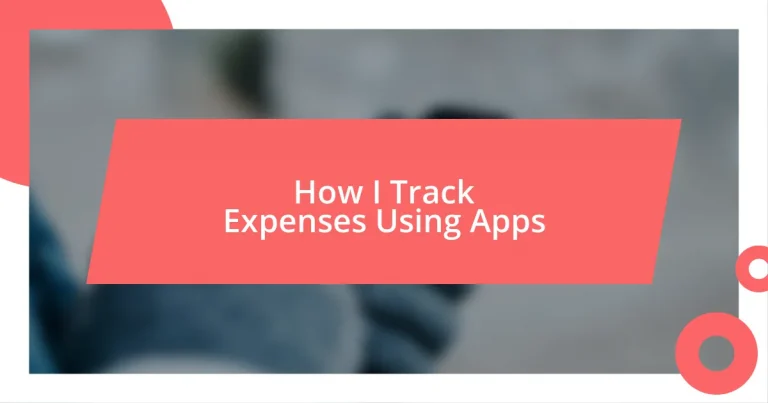Key takeaways:
- Expense tracking apps help users gain clarity over their spending habits, facilitating better budgeting and prioritization of financial goals.
- Consistently recording expenses and reviewing spending patterns can lead to enhanced financial awareness and improved decision-making.
- Customizable features and automatic syncing with bank accounts make these apps user-friendly, transforming expense tracking into an intuitive and efficient process.
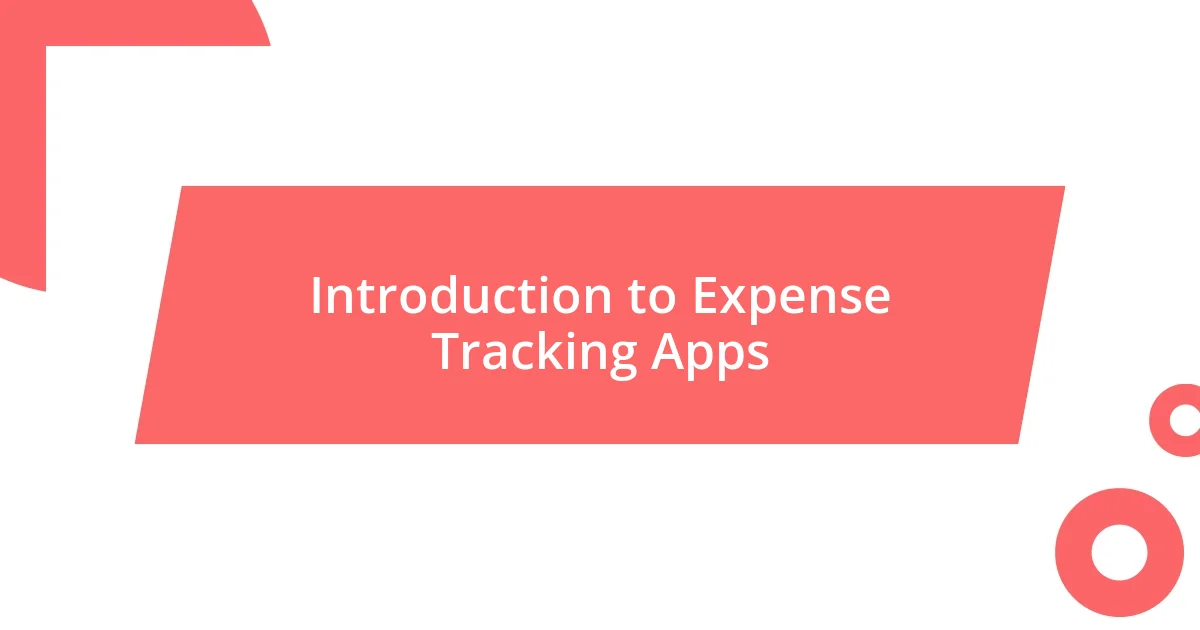
Introduction to Expense Tracking Apps
Expense tracking apps have revolutionized the way we manage our finances. I remember the overwhelming feeling of opening my bank statement each month and not quite knowing where my money went. These apps provide a clear window into my spending habits, and for many, they can turn financial chaos into clarity.
For me, using an expense tracking app was an eye-opening experience. The first time I categorized my expenses, I discovered I was spending way more on coffee than I realized! It made me question, “What really matters in my budget?” This insight has the power to reshape our spending priorities.
These apps often come with features like budget creation, categorization, and even spending alerts that help keep overspending at bay. Have you ever wished someone could just whisper, “Hey, slow down on those impulse buys”? That’s exactly what these apps do, acting as a friendly nudge toward better financial habits.
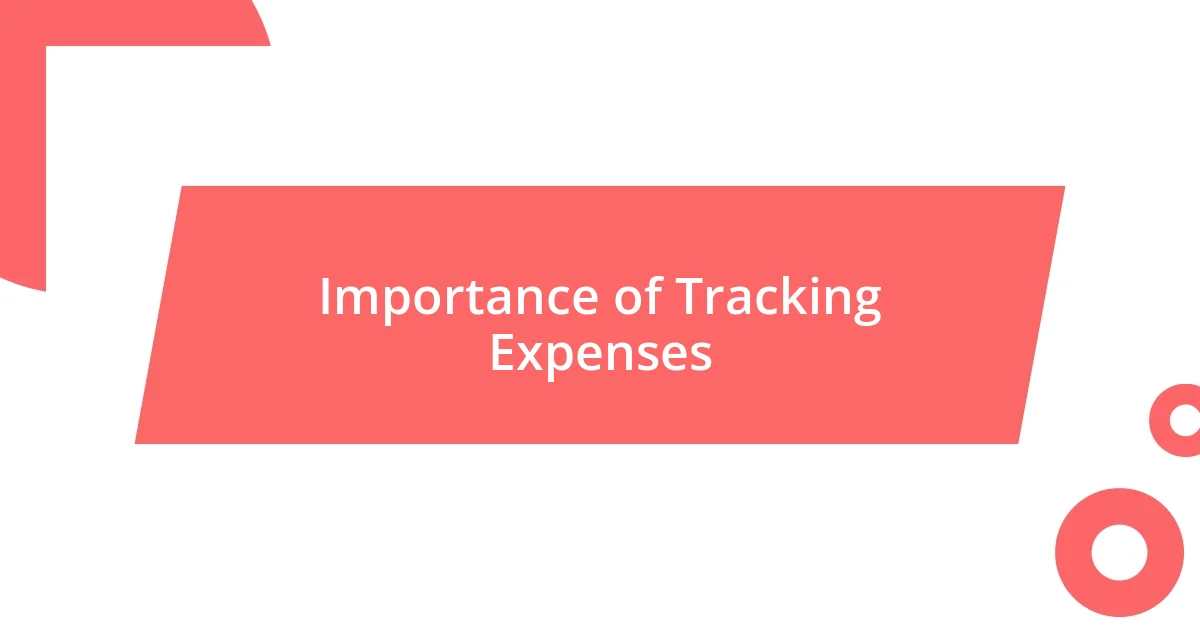
Importance of Tracking Expenses
Tracking expenses is crucial for recognizing patterns in how we spend. When I started diligently recording my expenses, it felt like lifting a fog from my financial landscape. It allowed me to see not just where my money was going, but also why certain purchases made me feel good at the moment, yet contributed to guilt later. Understanding this emotional relationship with spending can shift how we view our finances.
Moreover, monitoring expenses helps establish a budget, which serves as a roadmap for financial goals. One month, I noticed my grocery bill was consistently exceeding my expectations. By adjusting my shopping list and setting a budget, I was able to cut my grocery spending by nearly 20%! It’s a simple practice, but the feeling of accomplishment when you stick to a budget is immensely satisfying and empowering.
Lastly, tracking expenses cultivates discipline and proactive financial management. There have been instances where I would have been blindsided by unexpected bills had I not been vigilant about my expenditures. Knowing exactly where my funds lie gives me peace of mind, enabling me to face any financial surprise with confidence rather than despair.
| Benefits of Tracking Expenses | Effects |
|---|---|
| Recognize Spending Patterns | Improved Insight into Habits |
| Establish Budget | Increased Financial Control |
| Cultivate Discipline | Enhanced Financial Confidence |
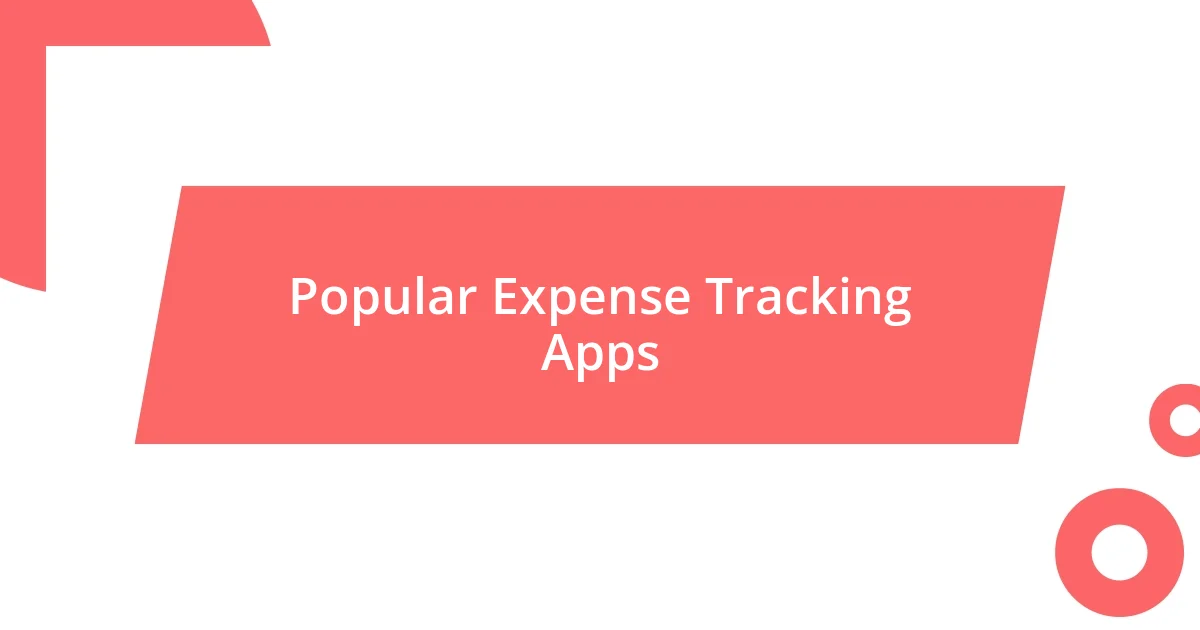
Popular Expense Tracking Apps
Several expense tracking apps have recently gained popularity due to their user-friendly designs and robust features, making financial management more accessible. Personally, I’ve tried a few, and while each has its strengths, there’s something uniquely satisfying about seeing my financial data visually represented. It’s like having a personal accountant in my pocket, ready to guide me whenever I need it.
Here are some notable apps I would recommend:
- Mint: A comprehensive platform that syncs with my bank accounts to categorize spending and create budgets automatically. It even sends alerts for bill payments—definitely a lifesaver!
- YNAB (You Need A Budget): This app emphasizes proactive budgeting. When I used it, I found myself assigning every dollar a job, which helped me feel more in control of my finances.
- Spendee: Designed with a visually appealing interface, Spendee allows me to manage shared expenses when traveling with friends. It made splitting costs effortless and fun.
- Personal Capital: Ideal for those looking to track investments in addition to expenses. I was pleasantly surprised at how it helped me see my net worth grow over time.
- GoodBudget: Utilizes the envelope budgeting method, which I found helps prevent overspending by allocating funds to specific categories each month.
Exploring these apps has allowed me to refine my financial habits. Each one brings a different flavor to managing my expenses, and they often come with unique tools that resonate with my spending personality. For instance, when I switched to YNAB, I found myself actively looking forward to my budgeting sessions, something I never thought I’d say! It felt empowering, like I had reclaimed control over my financial destiny.
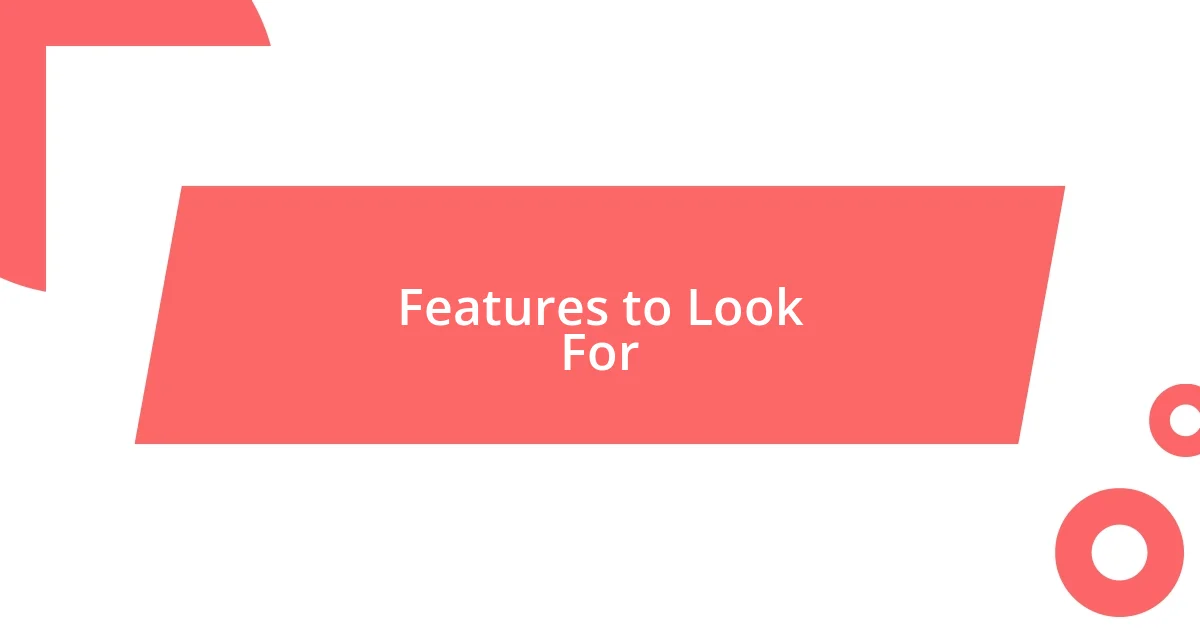
Features to Look For
When evaluating expense tracking apps, I find that user-friendly interfaces are a game-changer. I remember trying out an app that had a cluttered layout, and it left me feeling overwhelmed rather than organized. A smooth, intuitive design means I can quickly dive into my financial data without frustration. Wouldn’t you agree that simplicity allows us to focus on what truly matters—our spending habits?
Another feature I always look for is the ability to sync with my bank accounts. I vividly recall the hassle of manually inputting transactions; it felt like a chore that robbed me of motivation. Automatic syncing not only saves time but also ensures I have a complete picture of my finances. This functionality has made my tracking feel almost effortless, transforming it into a moment of clarity rather than a tedious task.
Lastly, I can’t stress enough the value of customizable categories. I once used an app that only offered generic spending labels, and it felt like trying to squeeze a square peg into a round hole. Having the ability to tailor categories to fit my lifestyle has made tracking expenses much more relatable. For instance, I have different sections for “dining out” and “treats,” reflecting my occasional splurges, which helps me stay true to my budgeting goals while still enjoying life. Isn’t that balance what we all strive for?
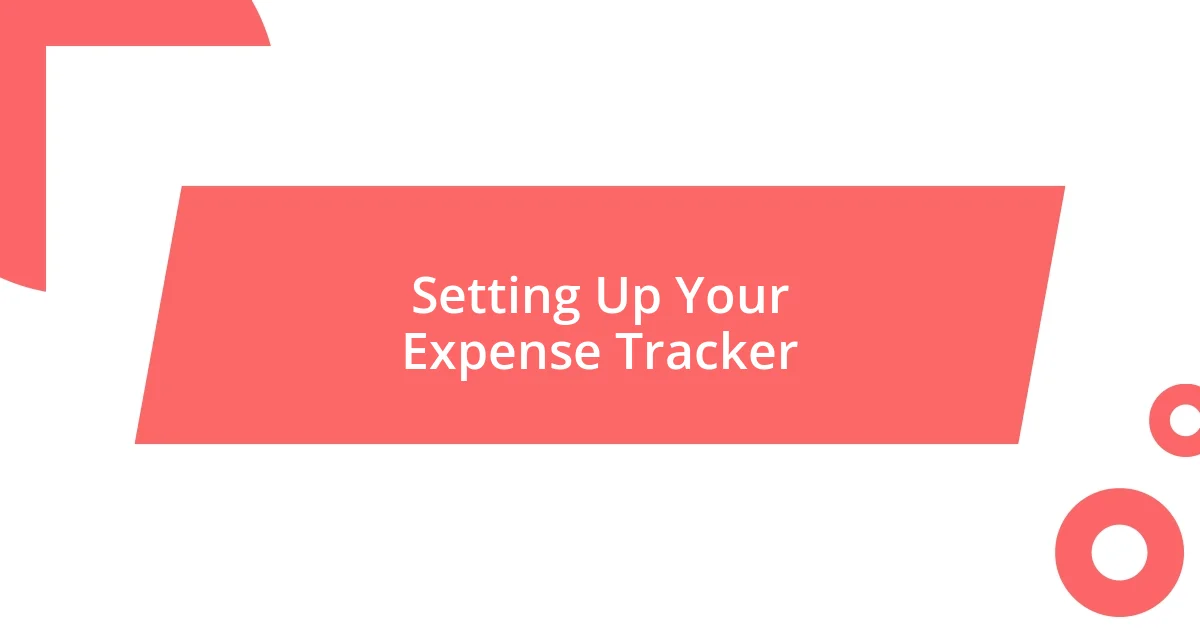
Setting Up Your Expense Tracker
Setting up your expense tracker is a crucial first step in gaining control over your finances. When I initially got started, I remember feeling a bit overwhelmed by the options available. But what truly helped was slowly customizing the app to suit my needs, ensuring it felt intuitive and not like a chore. Have you ever tried setting something up only to be frustrated by the complexity?
One essential aspect that I focused on was categorizing my expenses. I decided to create categories that genuinely reflected my lifestyle—things like “coffee runs” and “subscription services” that I knew would be recurring. This personalization made tracking so much more relevant. It wasn’t just numbers; it was my life laid out in front of me. I sometimes find myself reflecting, how can we budget effectively if we don’t first understand where our money goes?
Lastly, syncing my bank accounts took my expense tracking to a new level. The first time I connected my accounts, I was astonished at how automatically it updated my spending. It felt like the app was right there with me, ensuring I never lost track of a single purchase. This seamless integration saved me time and made me feel connected to my financial journey. It’s liberating, isn’t it, to have technology working with us rather than against us?
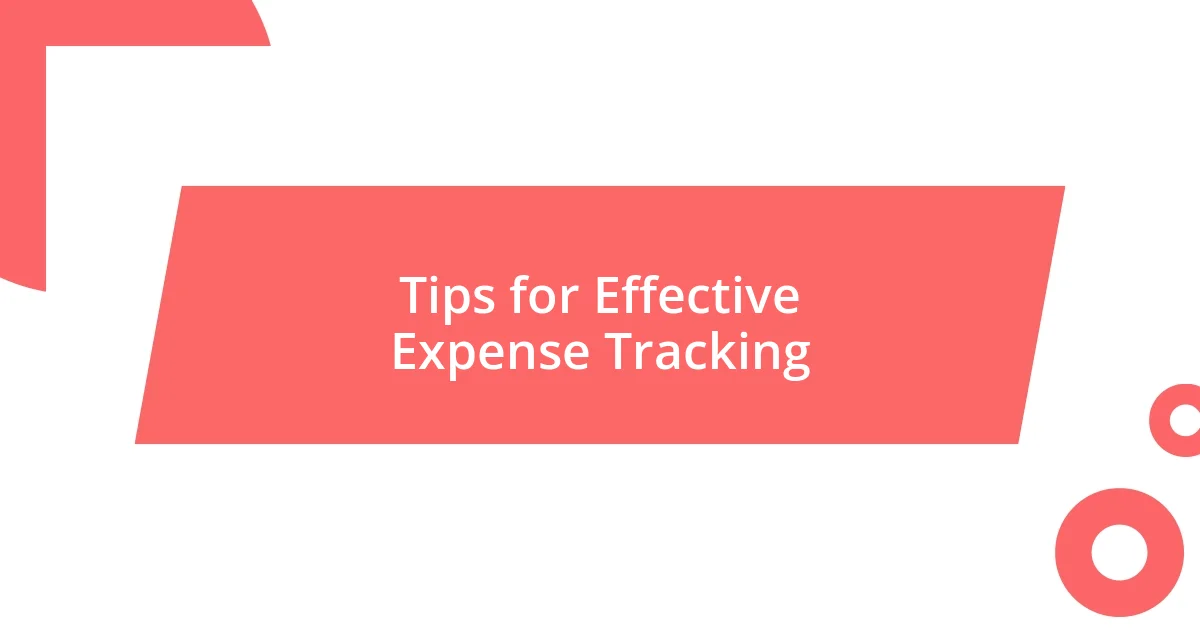
Tips for Effective Expense Tracking
Tracking expenses effectively is all about consistency. I’ll never forget the moment I started entering my purchases daily instead of letting them pile up. Initially, it felt tedious, but over time, it transformed my financial awareness. It’s true what they say: small, regular actions can lead to significant results. Have you tried making it a daily habit?
Another key tip is to review your expenses weekly. I remember the first time I sat down for my weekly review; it was like uncovering a treasure chest of insights. I was surprised to see just how much I was spending on impulse buys. This routine not only helped me understand my spending patterns but also reinforced my commitment to staying within my budget. It’s a simple practice, but the clarity it brings is priceless. How often do you take a step back to assess your financial health?
Lastly, don’t forget to set financial goals. When I started tracking, I made it a point to establish short-term and long-term goals for my spending and saving. I recall setting a goal to save for a vacation—suddenly, every expense felt purposeful. This focus not only motivates me but also makes tracking more meaningful. Ask yourself: what are you aiming for? Identifying your goals can turn what might feel like a mundane task into a rewarding journey.
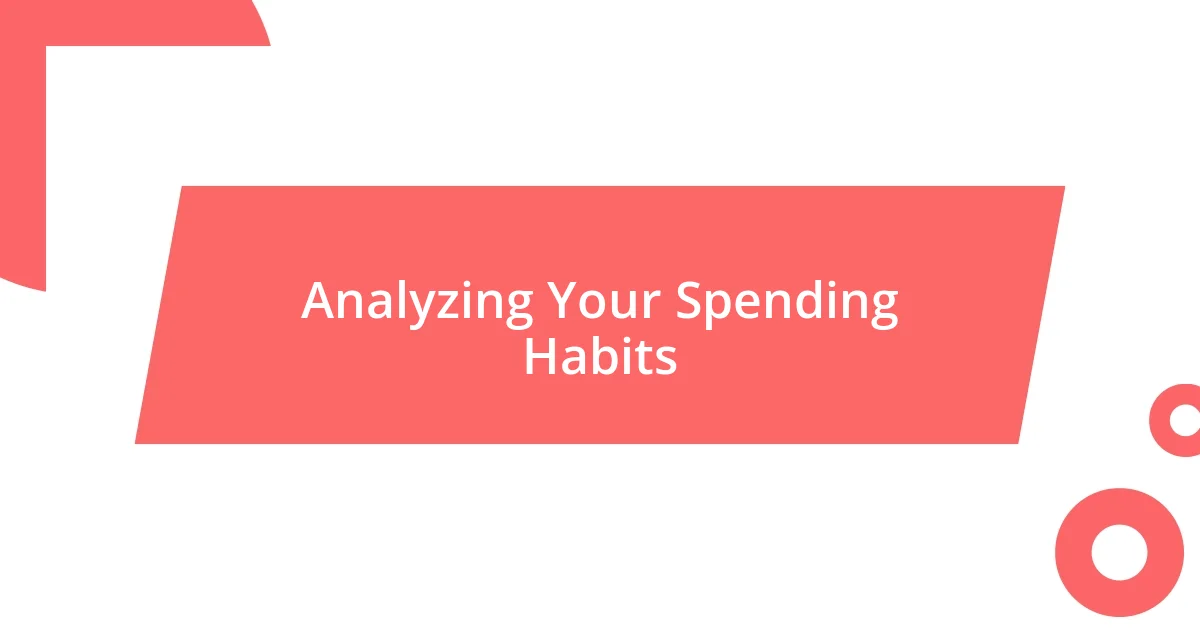
Analyzing Your Spending Habits
Analyzing your spending habits is an eye-opening experience. When I first delved into my transactions, I was surprised to discover where my money really went. I’ll never forget the moment I realized I was spending far too much on takeout. It made me wonder—what hidden expenses are lurking in your daily routine?
As I tracked my spending over several months, patterns began to emerge. I noticed that when I was stressed, I tended to shop more impulsively. This insight was pivotal for me; it didn’t just highlight a spending issue but pointed to an emotional trigger. Understanding this connection helped me implement healthier coping mechanisms. Have you ever thought about the emotional aspects of your spending habits?
Upon deeper reflection, I decided to take a month to strictly limit certain categories, like entertainment and dining out. I remember calculating how much I saved during that experiment—it was surprisingly significant! This journey taught me the importance of mindful spending and how much control I could regain. How about you—are you ready to dive into your habits and uncover those valuable insights?












